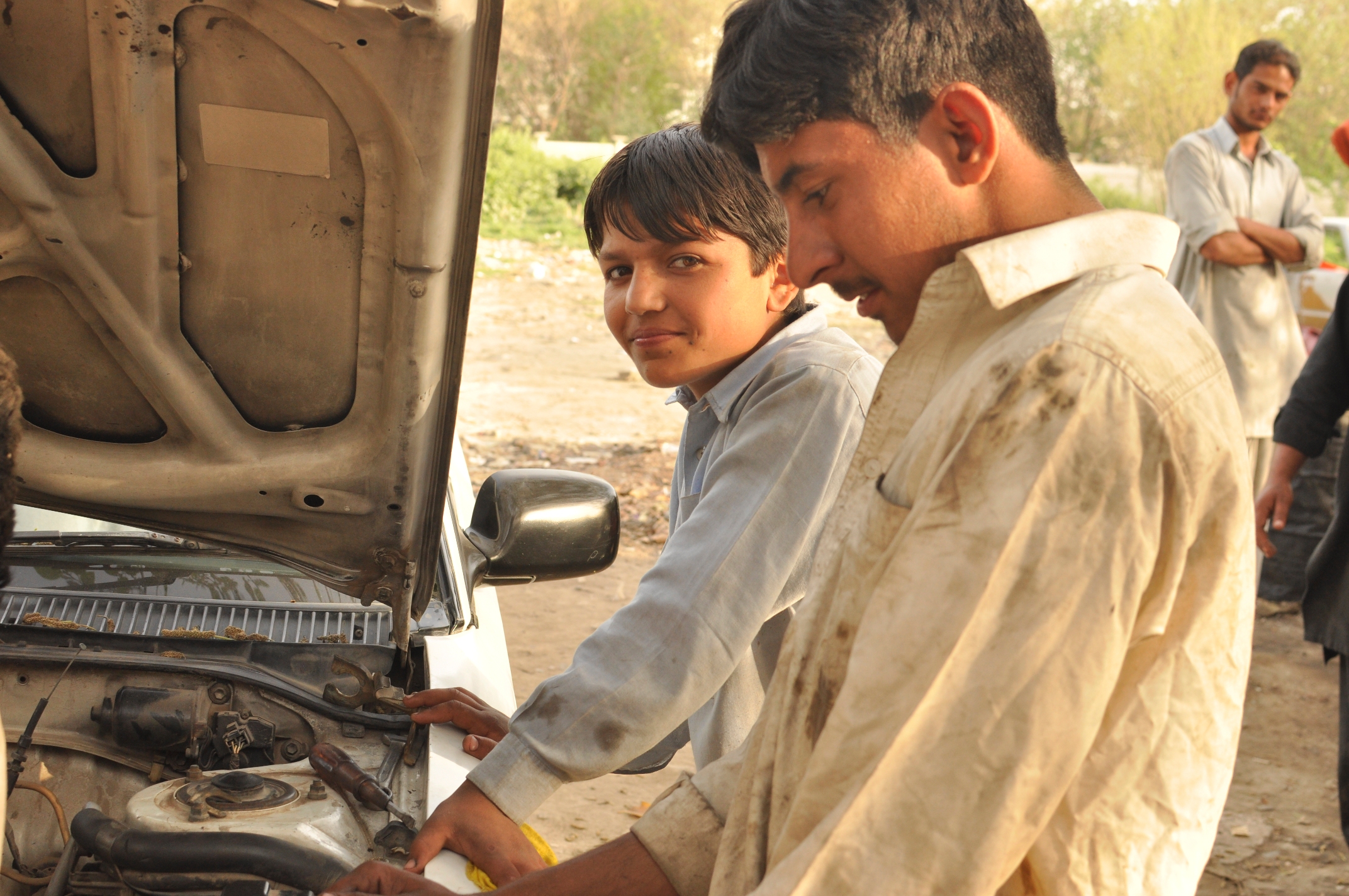Urbanized countries, such as Korea, are well aware of the importance of education. The passion toward education is so fierce in Korea, specifically, that numerous media—comedy programs, news broadcasts, movies, satires—warn this phenomenon as “overheated.” Compared to Korea, the emphasis on education in Pakistan is almost nonexistent. Instead, children are often spotted working as laborers.
12 year old Gurkey is an apprentice of the car repairman in Islamabad, Pakistan. Watching every movement of his master and older apprentices, he delivers tools and carries water buckets. For him, school is the least favorable option; getting a job is the top priority. In fact, he is in a lucky case compared to Lully.
Lully is 10 year-old Pathan—an ethnic group dispersed in Afghanistan and Pakistan—and Afghan refugee; his job is a cleaner. With his two other friends, he knocks on each household and cleans the front yard. He and his friends receive 20 rupees (22 cents on April 1, 2012) maximum only if they are lucky, because for most of the time, they cannot even enter the house. He cannot even interact with other Pakistani engineers like Gurkey did, because he cannot speak Urdu, the official language of Pakistan; he only speaks Sindhi.
Two children listed above are actually in minority job pools: the most popular job for children is being a beggar.
According to International Labor Organization, 3.3 million out of 40 million children in Pakistan are laborers, sadly under undesirable conditions. Especially in urban areas, more than majority of child laborers (73%) were working over 56 hours per week which is over the normal working hours (35 hours). They also get paid viciously small amount: Human Rights Commission of Pakistan reported that child laborers in the region called Sialkot receive less than 20 rupees (22 cents) for stitching one foot ball (a child produces about 3 footballs a day in average). Child labor in carpet industry was found to be the largest among other Pakistani industries, since 1 million out of 1.5 million carpet workers were children according to UNICEF and Government of Pakistan. Unfortunately, they also received about 10 rupees (11 cents) per hour under seriously unhealthy conditions: poor lightings, air filled with wool dusts and chemical dyes.
An Unrestricted baby boom and the vicious cycle of poverty—these are main reasons why such a vast number of children remain academically uneducated and work for money. According to U.S. Bureau of the Census (International Database), nearly 50 percent of the Pakistani population was under 16 years old. Furthermore, the majority of Pakistani families are in low-income groups. That is, despite having an unstable source of income, the majority of families hold more than two children.
Why can’t children be educated instead? On Islamabad, the school in the Pathan slum (that cannot be named due to its request) built for poor children does not charge an administration fee and only receives 500 rupees per month ($5.52). Yet, the principal spoke that the majority of village people cannot even afford this amount. Looking at the serious poverty of slum inhabitants—and uncontrolled birth rate and unhealthy bodies due to unhygienic environment which further push them into the poverty—children working instead of studying seems inevitable in Pakistan.
Source: U.S. Bureau of the Census, International Database, 2001.




Hi!:)
For this article, I would get quotes from other people. So far, this article looks more like an article seen on CNN or NYT. Too informative. I used to write articles without much quotes, because that is how I write in my school newspaper.School journalism doesn’t REQUIRE quotes. However, JSR program strongly recommends having quotes all over your articles. Quotes strengthen you articles! So…. all these information plus quotes from people around you would be super!! 😀
It is very difficult to find all information about Pakistan at one place and I have run exhaustive search but could find appropriate stuff, however this website provides very good information and should b shared with all those looking for Pakistan encyclopedia.Pakistan Encyclopedia.